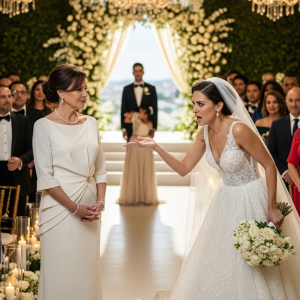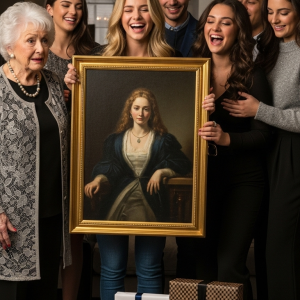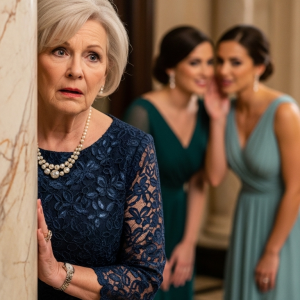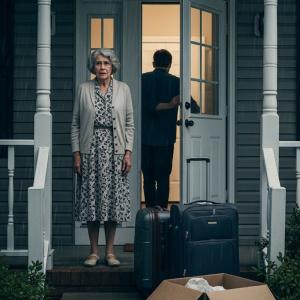The pain doesn’t hit you all at once. It seeps in slowly, like water through the foundation of a house you spent decades building, until one day the whole structure threatens to collapse. That’s what betrayal feels like when it comes from the people you literally gave life to.
My name is Catherine Winters. I’m fifty-seven years old and until six months ago, I thought I knew who I was. Mother of two, a former elementary school teacher, divorced for twelve years. I had settled into a quiet life in Rochester, New York, with my aging golden retriever, Max, and a part-time job at the public library.
My children, Madison and Jason, were successful adults living in Boston and Chicago. They’d come for obligatory holidays, always rushing, always checking their phones, always leaving earlier than planned. After the divorce, my ex-husband, Douglas, remarried quickly. Vanessa was fifteen years younger, sleek, and childless by choice. And somehow, over the years, she became “Mom” to them in ways I apparently never was.
I didn’t see it happening, not really. There were small signs: Madison consulting Vanessa about career moves, Jason calling her first with good news. But I told myself it was natural. Vanessa was glamorous, connected, wealthy. Of course, my children would be drawn to that light.
The Mother’s Day invitation came via text, three weeks before the event. A gathering at Madison’s vacation home on Lake Champlain. Douglas and Vanessa would be there. Jason and his new girlfriend, too. Would I come?
There’s a hunger in mothers that never quite goes away, a yearning to be needed that overrides self-preservation. So I drove the six hours to Vermont, my car packed with thoughtful gifts and a homemade blueberry pie that had been Madison’s favorite since childhood.
The lakehouse was sprawling and modern, with floor-to-ceiling windows showcasing the water. When I arrived, the driveway was already full of luxury cars. I parked on the street. My seven-year-old granddaughter, Emma, spotted me first. “Grandma Ellie, you brought Max!” She buried her face in his golden fur, and for a moment, I felt a surge of belonging. This was why I came.
Inside, Madison was arranging a charcuterie board. She glanced up briefly. “Mom, you’re here. There’s wine in the fridge. We’re eating in an hour.” No hug. No “Happy Mother’s Day.” Just instructions, as if I were another guest to be managed.
Vanessa stood by the fireplace, elegant in cream-colored linen. “Catherine,” she nodded coolly when she saw me. “Happy Mother’s Day.” The irony in her tone was subtle but unmistakable. I set my pie on the counter beside a display of boutique macarons. “Oh, thanks, Mom,” Madison said, barely glancing at it. “We’ve got plenty of dessert already, but we can put it out, too.”
The day unfolded with painful predictability. I sat on the periphery of conversations about Nantucket vacations and private schools. At dinner, catered from the best bistro in Burlington, my pie remained untouched.
“Grandma Vanessa took me shopping for my recital dress!” Emma announced, twirling in a frilly pink confection.
“Beautiful,” I said, swallowing hard. “When is your recital?”
“It was last weekend,” Madison interjected, not meeting my eyes. “We meant to invite you, but it was last minute, and we knew you were busy.”
Later, as the afternoon light softened, Madison suggested a family photo on the dock. I followed, trailing behind like an afterthought. Douglas stood with his arm around Vanessa. Jason and his girlfriend positioned themselves beside them. Madison arranged her husband and children in the foreground.
“Mom,” she said, turning to me with a smile that didn’t reach her eyes. “Can you take the picture?”
I reached for the phone she extended, but her husband, Richard, intervened. “No, no. I’ve got a tripod and timer. Everyone can be in it.”
Relief flooded me as I moved to stand beside Madison. But she shifted, creating a space between herself and Douglas. “Actually, Mom, can you step aside? I want my real mother in this picture.”
Time suspended. The words hung in the air, tangible and sharp. Vanessa gracefully slid into the spot Madison had created, linking arms with my daughter. I stood frozen, watching as they assembled the perfect family portrait. Mother, father, children, grandchildren. No space for the woman who had nursed them through nightmares and chickenpox.
Everyone watched me, silent, waiting for tears, for a scene. Instead, I smoothed my hair and smiled. “Funny. Even ghosts know when to leave the frame.”
I walked back to the house alone, listening to the mechanical click of the camera behind me, marking the moment of my official erasure. Inside, I gathered my untouched pie, my purse, Max’s leash. No one followed me. No one called after me as I loaded my car and drove away.

That night, in a motel halfway back to Rochester, something crystallized in me. I had spent my life being the understanding one, the forgiving one. I had taught my children that my love was unconditional, which they had interpreted as being without value, without consequence. It was time they learned differently.
The next morning, I went straight to the closet where I kept the boxes—decades of memories and evidence. I selected specific items carefully: Madison’s childhood journals, Jason’s college application essays where he’d written about his mother’s sacrifices, and the legal documents from the divorce they’d never bothered to read. The truth was a weapon I had never wielded before. I had always protected them. No more.
I packaged everything meticulously, adding a simple note: Remember who was there. Then I addressed it to Madison’s lakehouse and sent it priority mail. It was just the beginning.
Three days passed before my phone exploded. First, Madison’s text: What the hell, Mom? Seriously? Then Jason called four times. I let each call go to voicemail. Douglas emailed: We need to talk. I deleted it unread.
On the fourth day, I listened to their messages. Madison’s voice was high and tight with fury. “Mom, I don’t know what you’re trying to prove with this stunt! Those journals were private! Call me back immediately!”
Jason was more direct. “What is going on, Mom? You can’t just dump all this ancient history on us because you’re feeling neglected. Richard is asking questions about stuff that’s none of his business. Fix this!” Fix this. As if I were still the emotional janitor, tasked with cleaning up their messes.
I deleted the messages and took Max for a long walk. For decades, I’d carried the weight of their approval. Now, I’d set it down, and my steps felt easier for it.
When I returned home, Jason’s rental car was parked outside. He sat on my stoop, a scowl on his handsome face.
“Mom,” he said, standing as I approached. “We need to talk about this.”
He followed me up to my shabby apartment. “What is this about?” he demanded, pulling out photocopies of the divorce settlement. “Madison’s freaking out. She says Dad basically screwed you over. You agreed to everything.”
I filled Max’s water bowl before answering. “I did agree. Your father’s lawyer was very persuasive, and I wanted the divorce over with. To protect you and Madison from a prolonged battle.”
Jason flipped through the pages. As a financial analyst, he could see what I’d been too exhausted to fight: how severely I’d been disadvantaged, how skillfully Douglas had hidden assets. “Why didn’t you tell us?” He looked genuinely confused.
“Would you have believed me?” I asked simply. “You were twenty-two, in a job your father’s connections had secured for you. You both thought he hung the moon.”
He had the grace to look uncomfortable. “So this is what? Revenge? Because we don’t call enough?”
“This is truth, Jason. Nothing more.”
He ran a hand through his hair, a gesture so like his father’s it made my heart twist. “What do you want from us, Mom? An apology? More visits? Money?” The last word hung in the air, revealing exactly what he thought this was about. The insult was so profound I almost laughed.
“I want nothing from you,” I said, and I meant it. “Nothing at all.”
Something in my tone finally reached him. Alarm crept into his voice. “What are you planning to do?”
I smiled thinly. “Live by my own truth. Starting with this.” I handed him an envelope. He opened it and scanned the contents, his face draining of color.
“You can’t be serious. This will destroy Madison’s career.”
“That would be unfortunate,” I agreed, my voice level.
“Mom, these emails… if these get out…”
“Yes, I’m aware. Her pharmaceutical company might take issue with her sharing confidential research data with her husband’s investment firm. Insider trading, I believe they call it.”
His hands were shaking. “This isn’t you, Mom. You don’t do things like this.”
“You don’t know what I do anymore, Jason. You haven’t for a long time.” The originals, I explained, were safe with my lawyer, with instructions to be sent to the SEC if anything happened to me.
“Are you threatening us?” His voice was incredulous.
“I’m protecting myself,” I corrected. “Something I should have done years ago.”
The next morning, I made a significant withdrawal from my savings and called a realtor. “I’m not interested in maximum profit,” I told her. “I’m interested in speed.” My lease would end in thirty days. By the time my children realized what was happening, I would be gone.
Madison called that evening, her voice sharp with fury. “What the hell are you doing? Jason told me about your little blackmail scheme!”
“It’s not blackmail,” I corrected her. “Just insurance.”
“This is insane, Mom! You’re threatening to destroy my career over some perceived slight?”
“Is that your professional diagnosis? Based on the psychology degree I paid for?” I asked mildly. I let the silence hang before continuing. “Ask your father about Diane Reynolds.”
“Who?”
“His assistant. The real reason for our divorce.” I could practically hear her mind racing, recalibrating the narrative she’d built around her parents’ split. Douglas had always presented it as an amicable parting. I’d played along, absorbing my children’s resentment, to protect them.
“I don’t believe you,” Madison said, but her certainty had faltered.
“History shapes the present, Madison. Your contempt for me didn’t form in a vacuum. It was carefully cultivated by your father’s narrative.” I paused. “The emails will remain secure as long as I remain undisturbed. Consider it a boundary. The first one I’ve successfully enforced with you in decades.”
The next morning, I met with my lawyer to finalize the amendments to my will. “My children receive nothing,” I instructed him. “Not a penny, not a photograph, unless they fulfill the requirements.”
“Requirements they’ll likely find impossible,” he observed.
“That’s rather the point,” I corrected.
That evening, I received a text from Douglas: We need to talk. The kids are upset. Dinner tonight, 7:00pm at Giovanni’s. Giovanni’s, our old date night spot where he’d first told me he wanted a divorce. The presumption was so breathtaking I nearly laughed. I didn’t respond. Instead, I drove to the bank and accessed my safe deposit box. Inside was a thumb drive with every piece of evidence I’d collected but never used: emails proving Douglas had hidden assets, documentation of his affair.
I made copies, then drove to the offices of the state bar association’s ethics committee. As I handed over the envelope, I felt nothing. Just the clean, cold sensation of justice, long delayed, finally in motion.
That night, my doorbell rang. Douglas stood in the hallway, his face flushed with anger. “What have you done?” he demanded.
I smiled. “Come in, Douglas. We have so much to catch up on.”
He took in the half-packed boxes, the bare walls. “You filed an ethics complaint against me. Have you lost your mind?”
“I’ve found it, actually.” I folded my arms. “I don’t report to you anymore, Douglas. I haven’t for twelve years.”
“Whatever grievances you have, this isn’t the way. You’re hurting the kids.”
“Am I? How exactly does exposing your financial misconduct hurt them?” I stepped closer. “I want you to understand what it feels like to lose everything you value. I want you to know what it’s like when the people you love most decide you’re disposable.”
The color drained from his face. “You’re talking about the kids. What have you done?”
“Nothing yet. But they’ll learn the truth about you. The affairs, the deceptions. And they’ll have to choose: stand by you and become complicit, or admit their perfect father is a fraud.”
After he left, slamming the door, I sat on my bare mattress and waited for the emotional backlash. Guilt, regret. None came. I felt oddly peaceful. The next morning, Madison was at my door, her eyes red-rimmed.
“How could you?” she demanded. “Dad could lose his license, everything he’s worked for.”
“Everything we worked for,” I corrected her. “The difference is, he walked away with it, and I walked away with nothing.”
She sank onto the single remaining chair, looking young and lost. “Mom, what do you want from us? Just tell me and we’ll do it.”
“I want nothing from you,” I repeated. “Not your time, not your attention, not your performative guilt. I’m choosing myself. For the first time in fifty-seven years.”
“The family will never recover,” she said, a last desperate attempt to sway me.
I met her gaze steadily. “The family you wanted doesn’t include me, Madison. You made that perfectly clear. I’m simply acknowledging what has been true for years.”
Three months later, I sat on the balcony of my beachfront rental in Clearwater, Florida. Freedom, I’d discovered, suited me. My phone chimed with a forwarded email from my lawyer. It was from Jason.
Mr. Kleinman, Dad’s license has been suspended. Madison is on administrative leave. Everything is falling apart. Please, tell our mother we need to talk. Tell her we’re sorry. Tell her whatever she wants, she can have it. Just make this stop.
I deleted it. Another chime. A text from an unknown number. Mom, it’s Madison. Please call me. Dad’s not doing well. Vanessa left him.
I blocked the number. Vanessa had left him. Poetic justice had its own elegant timing.
The next morning, a package arrived by special courier. It was from Douglas. Inside were legal documents and a handwritten note.
Catherine, You were right about everything. I’m selling the house. Vanessa is divorcing me. The practice will likely never recover. Enclosed you will find signed paperwork transferring ownership of the lakehouse to you, and a trust I’ve established in your name with funds that should have been yours. I know it’s too little, too late. The kids are devastated. They miss you. They need you. If you ever want to contact us, we’ll be here. If not, at least you’ll have what should have been yours all along. Douglas
Once, this gesture would have moved me. Now, I felt only a detached sense of completion. I called my lawyer.
“Accept the transfer,” I instructed him. “Sell the lakehouse and donate the proceeds to a women’s shelter. Anonymously. And the trust? Set aside college funds for Emma and Liam. The rest can go to a scholarship for single mothers. Also anonymously.”
“Catherine, that’s nearly two million dollars,” Harold said carefully. “Your children are suffering.”
“Not revenge, Harold,” I said. “Consequences.”
That evening, a final email arrived from Harold with scanned letters from my children. Madison’s was a desperate plea.
Mom, everything’s falling apart. I said something unforgivable at the lakehouse. The truth is, I was showing off for Vanessa. Trying to prove I was sophisticated enough for her world. And in doing so, I threw away the mother who actually raised me. Please come back. Please help us fix this. Your daughter, if you’ll still have me.
Jason’s was more direct.
Mom, I know we don’t deserve your forgiveness. I know we treated you like you didn’t matter. Dad told us everything. I’ve never seen him like this. He’s broken. We’re all broken. I need you to know that I understand now, and I’m so sorry.
I closed my laptop and walked out onto the balcony. The moon cast a silver path across the dark water. Their pain was real, their regret genuine, and none of it touched me. The woman who would have rushed to their rescue was gone. In her place stood Catherine Winters, a woman who had finally learned the value of her own peace.
Tomorrow, I would look at real estate listings. Perhaps a small house with a garden in Arizona or New Mexico. The only certainty was that I wouldn’t go back. Their story was no longer my responsibility. My phone buzzed with a text from my new neighbor, inviting me to book club.
Still on for tomorrow night? We’re discussing The Year of Magical Thinking.
I smiled and texted back. Wouldn’t miss it.
As I prepared for bed, I caught my reflection in the mirror. The woman who gazed back seemed younger, unburdened, her eyes clear. I hardly recognized her. Or perhaps, I was finally seeing her clearly for the first time. Catherine Winters, not defined by motherhood or marriage, but by her own quiet strength, her newfound freedom, and her refusal to be erased.




